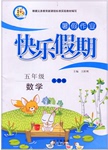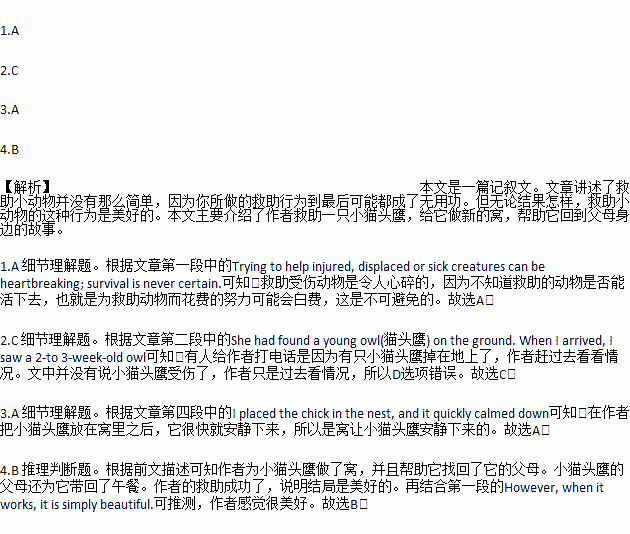题目内容
I work with Volunteers for Wildlife, a rescue and education organization at Bailey Arboretum in Locust Valley. Trying to help injured, displaced or sick creatures can be heartbreaking; survival is never certain. However, when it works, it is simply beautiful.
I got a rescue call from a woman in Muttontown. She had found a young owl(猫头鹰) on the ground. When I arrived, I saw a 2-to 3-week-old owl. It had already been placed in a carrier for safety.
I examined the chick(雏鸟) and it seemed fine. If I could locate the nest, I might have been able to put it back, but no luck. My next work was to construct a nest and anchor it in a tree.
The homeowner was very helpful. A wire basket was found. I put some pine branches into the basket to make this nest safe and comfortable. I placed the chick in the nest, and it quickly calmed down.
Now all that was needed were the parents, but they were absent. I gave the homeowner a recording of the hunger screams of owl chicks. These advertise the presence of chicks to adults; they might also encourage our chick to start calling as well. I gave the owner as much information as possible and headed home to see what news the night might bring.
A nervous night to be sure,but sometimes the spirits of nature smile on us all! The homeowner called to say that the parents had responded to the recordings. I drove over and saw the chick in the nest looking healthy and active. And it was accompanied in the nest by manfen5 the greatest sight of all — LUNCH! The parents had done their duty and would probably continue to do so.
1.What is unavoidable in the author’s rescue work according to paragraph 1?
A. Efforts made in vain.
B. Getting injured in his work.
C. Feeling uncertain about his future.
D. Creatures forced out of their homes.
2.Why was the author called to Muttontown?
A. To rescue a woman.
B. To take care of a woman.
C. To look at a baby owl.
D. To cure a young owl.
3.What made the chick calm down?
A. A new nest.
B. Some food.
C. A recording.
D. Its parents.
4.How would the author feel about the outcome of the event?
A. It’s unexpected.
B. It’s beautiful.
C. It’s humorous.
D. It’s discouraging.
 一诺书业暑假作业快乐假期云南美术出版社系列答案
一诺书业暑假作业快乐假期云南美术出版社系列答案
